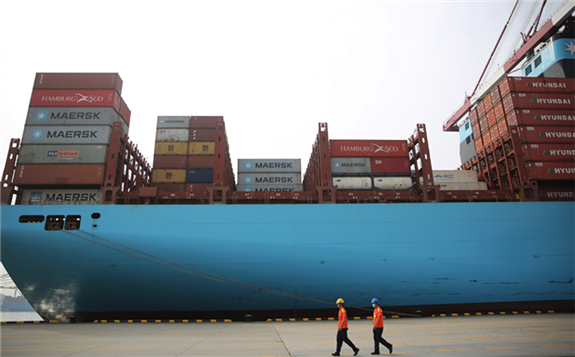12 nations mount united response to lift supply chains amid COVID-19

China is working with a number of countries to spur pragmatic economic, trade cooperation, boost goods trade volume and stabilize industrial chains to facilitate regional and global economic recovery, the Ministry of Commerce said on Thursday.
The joint ministerial statement issued by China's Ministry of Commerce, the Ministry of Trade and Industry of Singapore, and commerce authorities from 10 other countries-Australia, Brunei, Canada, Chile, Laos, Myanmar, Nauru, New Zealand, the United Arab Emirates and Uruguay-earlier this month has fully demonstrated China's solid support for international cooperation against COVID-19, and its consistent stance of firmly upholding free trade, said Gao Feng, the ministry's spokesman.
Countries like Australia, Canada, Chile, China, Myanmar, New Zealand, Singapore, the United Arab Emirates and Uruguay have pledged that they are committed to maintaining open and connected supply chains, to create a collective response to the pandemic that has severely affected the global economy in the past few months.
The 12 trade partners agreed to work closely to identify and address trade disruptions with ramifications on the flow of necessities, and recognized that it is in their mutual interest to ensure that the trade channels remain open, including air and sea freight, to facilitate the flow of goods including essential supplies, according to the joint statement.
They affirmed the importance of refraining from the imposition of export controls or tariffs and non-tariff barriers and of removing any existing trade restrictions on essential goods, especially medical supplies at this time, said the ministry.
Based on the consensus, the trade and economic authorities of the 12 nations also committed to working with all like-minded countries to ensure that trade continues without any friction, and critical infrastructure such as air and seaports remain open to support the viability and integrity of supply chains globally.
This move will not only encourage these countries to unite to respond to the challenges of the pandemic, and inject strong momentum into the economic development of the Asia-Pacific region, but also show partner countries' willingness to align with high-standard international economic and trade rules, said Xue Rongjiu, deputy director of the China Society for WTO Studies in Beijing.
It will also help upgrade China's value chain and enhance the country's capability to withstand external risks in the industrial, supply and service chains, he said.
China will remain a competitive supply chain choice for foreign firms as it has a broad spectrum of strong upstream suppliers and downstream clients, said Julien Hueber, executive vice-president of Industry Solution and Project Business Group at Nexans, the French cable manufacturer. The company, supported by over 26,000 employees globally, started to run a new laboratory in its Suzhou plant last month.
With an investment of 17 million yuan ($2.43 million), the new research facility focuses on the relevant advanced robot cable standards in China, Europe and the United States. The establishment of the laboratory has notably improved the research and development capabilities of Nexans China to produce high-end cables that can be used for various industrial robots.
At present, Nexans' production and operation in China has fully returned to normal. It will continue to increase investment in the country, as well as introduce advanced production lines, and integrate and reorganize advantageous assets and technologies, said Hueber. It will also enhance its supply chain's industrial value in both China and the rest of the world.